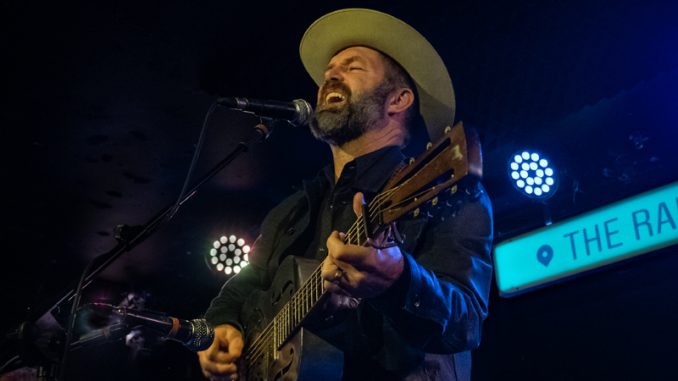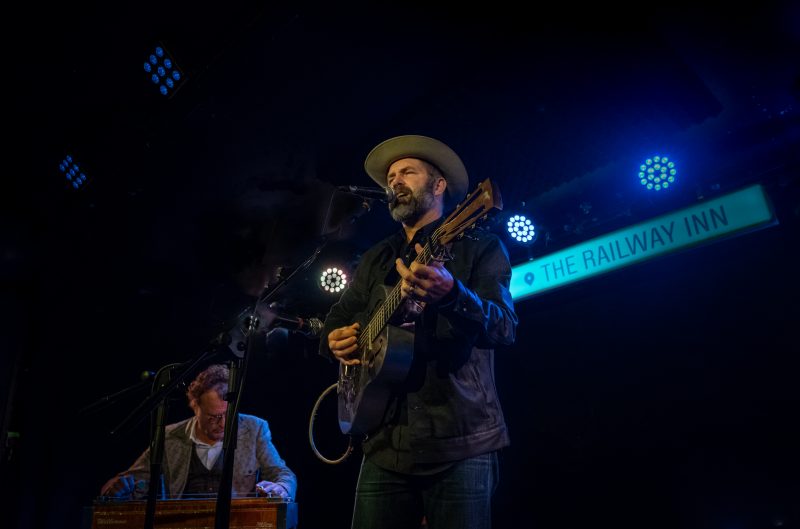
A search of the Americana UK website archives reveals an article announcing a string of Jeffrey Foucault UK dates for April 2020. I don’t need to tell you what happened to those. Almost exactly two years after I should have seen him play in London, I caught Foucault’s set at Water Rats with his wife Kris Delmhorst, a beautiful, low-key set with the two of them sharing a single condenser mic for vocals and guitars, and, in a magical moment, their daughter joining on harmony vocals for a couple of songs.
Jeffrey is now back with pedal steel maestro Eric Heywood (Son Volt, Pretenders and many more) and touring the UK until 24 November. Support comes from Boston-based Dietrich Strause who wraps an expressive voice with shades of Jackson Browne around his evocative, meditative lyrics and plays a woodily warm Martin so vintage that it long ago lost its logo from the headstock.
Foucault and Heywood began the tour with an intimate set for around 30 punters in High Wycombe, courtesy of Paul Kemp and his very appropriately named Kingsmead House Concerts. There were some fascinating contrasts between that quietly charming show and their first ‘rockbox’ gig at Winchester’s Railway Inn where the walls reverberated to the metallic tang of Foucault’s tricone, soothed and haunted by Heywood’s pedal steel: not so much face-melting as soul-dissolving. Time and again, you could see Jeffrey shaking his head in wonder at the sounds his friend coaxed from it. And one of the great joys of a show like this is seeing two virtuosos playing off each other and revelling in it; finding new paths through old songs and possible paths through new songs – one Jeffrey had taught Eric half an hour before showtime at High Wycombe. They’re still experimenting with keys and arrangements.

The sounds that Foucault shakes from the world with his guitar and extraordinarily rich, warm and versatile voice are remarkable. There is the delicate folk familiar from his early albums, but more often the songs lean towards blues, including a chilling version of the traditional murder ballad ‘Pretty Polly’. Equally distinctive is the poetry in Foucault’s lyrics, from the pin-sharp description of ‘the lights on the big trucks … like gun camera tracers’ to a verse such as this: ‘When you laugh / I feel like crying / When you cry / I don’t know what to do’; devastating in its truth and simplicity.
One of several new songs, ‘Solo Medelo’, is a meditation on life on the road without his long-time drummer and close friend Billy Conway who died nearly two years ago, a gentle play on words around the loneliness of a solo beer, solo coffee, solo [show] in Milwaukee, and feeling ‘so low’, floored by grief, that he is left to wonder whether it’s time to walk away. But it’s not a slow, deliberate ballad; the syncopated rhythm of this relaxed strummer sets off the poignancy of the lyric; typically unpredictable, Foucault swerves left when you expect him to go right.
Another new song, ‘When the Curtain Comes Down’, reflects on the legacy and longevity of someone who has chosen a life writing, recording and playing music; it is a stark facing-down of what we leave behind; for someone like Foucault, the sound of a ghost in a speaker. But for many of us who love music, those ghosts – so many gone now, so many going – are spirits that have transformed us.
There are rock’n’roll shows that make you feel glad to be alive. And then there are those shows that also make you contemplate what it means to be alive. Foucault has many sounds still to shake from this broken, precious world. There’s a new album next year. I can’t wait to hear more.
Pictures by Paul Bevan. https://www.instagram.com/paul_bevanmusicphotos/



Lovely writing, Sir !
Thanks, Mike!